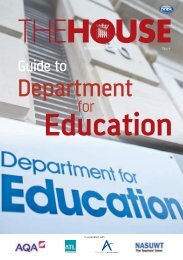Oracy
2fcBkno
2fcBkno
You also want an ePaper? Increase the reach of your titles
YUMPU automatically turns print PDFs into web optimized ePapers that Google loves.
Some solutions<br />
Riz Saleem is a year 6 teacher at Eastwood<br />
Primary School. She says that when she<br />
began using talk-based activities in her<br />
lessons she felt anxious about not having<br />
anything to show for them:<br />
“When I started using talk, I thought, ‘the children<br />
aren’t writing anything down…. I’ve done a talk<br />
activity all lesson, what do I place in their books<br />
as evidence?’”<br />
Riz Saleem, year 6 class teacher<br />
She was also concerned that this would mean the pupils<br />
would “think they’re not working when they’re talking.”<br />
Riz says three things helped her move beyond this:<br />
• A supportive school ethos that values and endorses talking in lessons<br />
• Gathering different forms of evidence from video footage, photographs, and diary logs<br />
• Setting ground rules for talk with her pupils, and explaining why talk-based activities are important<br />
Interviewees all feel that, ultimately,<br />
embedding oracy is about mindset. School<br />
leaders should be vocal and consistent<br />
in their support of oracy in order to give<br />
classroom teachers the confidence to<br />
move it up their agenda. Amy Gaunt, a<br />
class teacher at School 21, suggests:<br />
“I think a lot of it is about a mentality shift [so that]<br />
it’s seen that it’s not an addition to the curriculum,<br />
it’s how you deliver the curriculum”<br />
Amy Gaunt, Head of <strong>Oracy</strong> Primary, School 21<br />
Lack of confidence and expertise<br />
Despite emphasising oracy’s importance in supporting pupils’ development in a range of areas and even<br />
though they report frequently using strategies to support oracy, over half of all teachers (57%) say they<br />
have not received any training in oracy in the last three years (n=906). Furthermore, more than half (53%)<br />
would not know where to go if they needed information about oracy. This is a particular problem for<br />
secondary teachers, who are significantly less likely to know where to go for further information about<br />
oracy than their primary or FE counterparts.<br />
Secondary and FE teachers are significantly more likely to say they have not received any training in the<br />
last three years. Again, this may be linked to subject specialism given that 68% of maths teachers and<br />
71% of science teachers said they have not received any training in oracy over the last three years.<br />
“My school has not provided or arranged any training for me on oracy in the last 3 years”<br />
45% 42% 61% 65%<br />
Early Years 29 Primary 251 Secondary 409 FE 89<br />
Worryingly, fewer than half of teachers consider themselves ‘very confident’ when it comes to:<br />
• Explaining the technicalities of language to pupils • Creating an environment in their classrooms<br />
in which oracy is valued<br />
62




